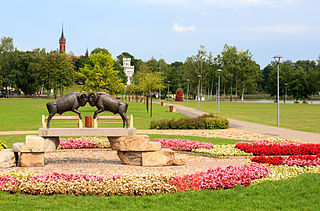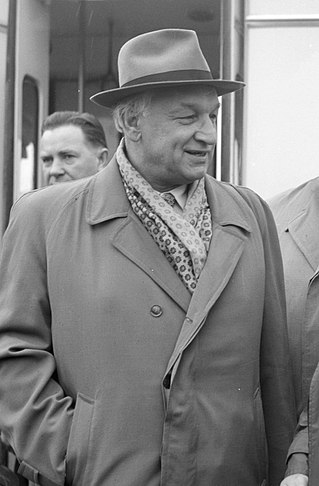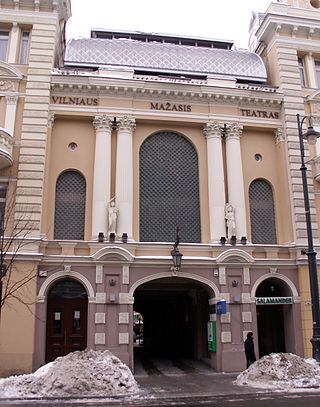Related Research Articles

Druskininkai is a spa city on the Nemunas River in southern Lithuania, close to the borders of Belarus and Poland. The city of Druskininkai has a population of 12,055 and dates back as a spa resort to the 19th century.

Rasos Cemetery is the oldest and most famous cemetery in the city of Vilnius, Lithuania. It is named after the Rasos district where it is located. It is separated into two parts, the old and the new cemeteries, by a narrow Sukilėliai Street. The total area is 10.8 ha. Since 1990 new burials are allowed only to family graves.

Justas Paleckis was a Lithuanian Soviet author, journalist and politician. He was nominal acting president of Lithuania after the Soviet invasion while Lithuania was still ostensibly independent, in office from 17 June to 3 August 1940. He then remained the head of state of the Lithuanian SSR until 1967.

Mikalojus Konstantinas Čiurlionis was a Lithuanian composer, painter, choirmaster, cultural figure, and writer in Polish.
Antanas Škėma was a Lithuanian writer, playwright, stage actor and director. His best known work is the novel Balta drobulė.

Lithuanian literature concerns the art of written works created by Lithuanians throughout their history.
Daina Society was a Lithuanian cultural organization promoting Lithuanian folk traditions and songs. It was established as an illegal cultural society by the composer Juozas Naujalis and officially registered with the Tsarist authorities in 1905. Active from 1899 to 1944 in Kaunas, the society organized various events, concerts, amateur theater performances. In 1924, it initiated the first Lithuanian Song Festival.

Baron Stasys Šilingas was a prominent lawyer and statesman in interwar Lithuania.

The Metropolitan Archdiocese of Kaunas is a Latin Church ecclesiastical territory or archdiocese of the Catholic Church in Lithuania. The episcopal see is in Kaunas, the second-largest city in Lithuania. The archdiocese's motherchurch and cathedral is Kaunas Cathedral Basilica; it is also home to a Minor Basilica in a town of Šiluva, in the region of Samogitia.

Antanas Žmuidzinavičius was a Lithuanian painter and art collector.
Ugnė Karvelis was a writer, a translator and a member of the UNESCO Executive Board from 1997 to 2002.
Antanas is a Lithuanian masculine given name derived from Antonius that is equivalent to Anthony in Lithuania. It may refer to:

Juozas Balčikonis Gymnasium is a secondary state school located in Panevėžys, Lithuania. Teaching started in 1727, however, school reorganised to gymnasium in 1858, making it the oldest gymnasium type school in Lithuania. Juozo Balčikonio gimnazija is always one of the top-ranked institutions in the Lithuania for the high quality of its teaching, long lasting traditions and notable alumni.
Žiburėlis later Lietuvos žiburėlis was a charitable society providing financial aid to gifted Lithuanian students. The society grew out of the Lithuanian National Revival, hopes of creating Lithuanian intelligentsia, and frustration over financial hardships faced by many young students. It was established in 1893 by Gabrielė Petkevičaitė-Bitė and Jadvyga Juškytė, and led by Felicija Bortkevičienė from 1903 until its dissolution in 1940.
Viltis was a Lithuanian-language newspaper published in Vilnius in 1907–1915 and 1991–1994. The newspapers was established in October 1907 by Antanas Smetona and Juozas Tumas-Vaižgantas. It promoted unity among Lithuanians attempting to bring together conservative Catholic clergy and more liberal intelligentsia. The newspaper concentrated on cultural matters as opposed to politics or news reports. It was supported by the clergy, but it was not a religious newspaper. Eventually, the clergy grew dissatisfied with the secular and moderate tone and Smetona left in 1913 to establish a separate newspaper Vairas. The intellectuals around Viltis became known as viltininkai and formed an early embryo of the Lithuanian Nationalist Union, the ruling party in Lithuania in 1926–1940. Viltis was discontinued due to World War I. It was briefly resurrected in the early 1990s by the Lithuanian Nationalist Union.

Rūta Society was a Lithuanian cultural society in Vilnius, then part of the Russian Empire, active from 1909 to the outbreak of World War I in 1914. It organized various events, including lectures, literary evenings, and musical performances, but it is most noted for its contribution to the development of the Lithuanian theater. In total, Rūta staged about 50 plays.
America in the Bathhouse is a three-act comedy by Keturakis. The play was first published in 1895. It became the first Lithuanian-language play performed in public in present-day Lithuania when a group of Lithuanian activists staged it on 20 August 1899 in Palanga. The play depicts an episode from the everyday life of the Lithuanian village – a resourceful man swindles money from a naive woman and escapes to the United States. Due to its relevant plot, small cast, and simple decorations, the play was very popular with the Lithuanian amateur theater. It became one of the most popular and successful Lithuanian comedies of all time and continues to be performed by various troupes.

Ažytėnai is a village in Kėdainiai district municipality, in Kaunas County, in central Lithuania. According to the 2011 census, the village had a population of 239 people. It is located 9 kilometres (5.6 mi) from Krakės, by the Ažytė river and its tributary Ažytėlė. There are library, school, medicine station, agriculture cooperative.